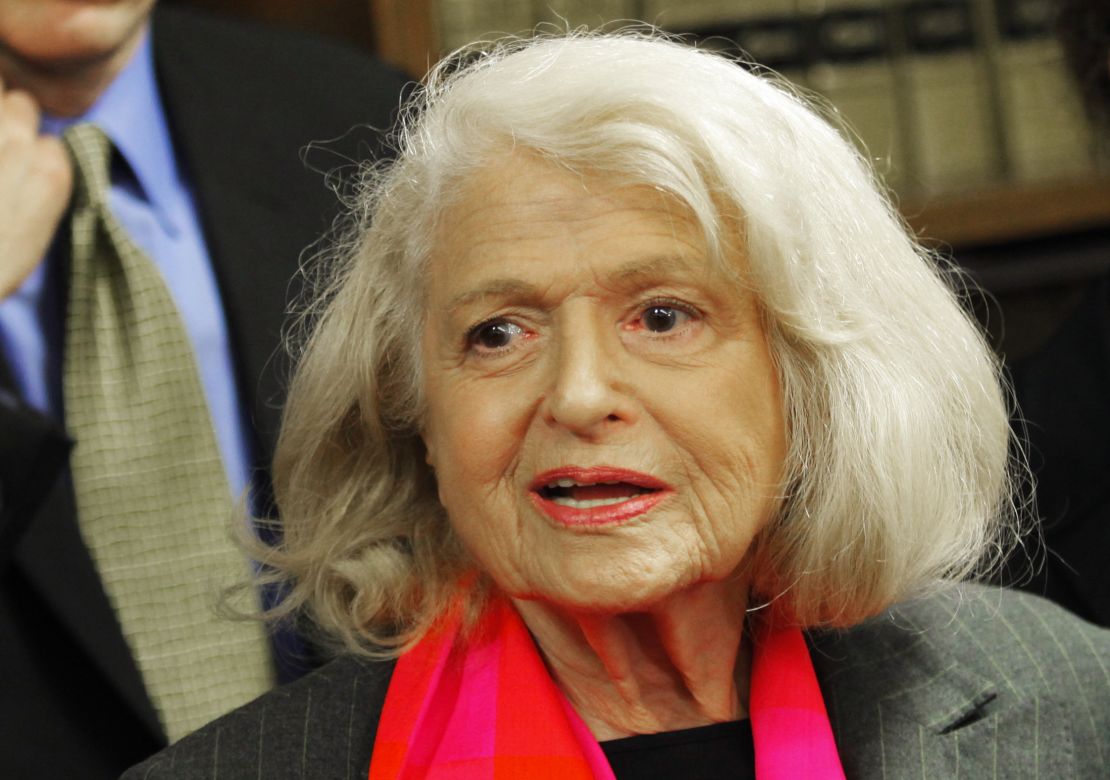Editor’s Note: Edith Windsor, 83, is the plaintiff in the Supreme Court case challenging the Defense of Marriage Act.
Story highlights
Edith Windsor: I never thought I would be an 83-year-old "out" lesbian suing the government
She and Thea Spyer married in Canada, but DOMA means U.S. doesn't recognize it
Windsor: DOMA is painful and wrong and Thea would want me to stand up for our marriage
She says marriage equality would be "best possible final chapter in our love story"
On Wednesday, the United States Supreme Court heard arguments in my case challenging the discriminatory Defense of Marriage Act, widely known as DOMA. I was honored and humbled by the opportunity to have my case considered by our nation’s highest court. I have also been overwhelmed by the love and support I have received from people all across the country.
To be honest, I never could have imagined that this day would come – the day that I would be “out” as an 83-year-old lesbian suing the federal government.
My late wife, Thea Spyer, was, and is, the love of my life. Although we couldn’t live openly for much of our relationship, we became engaged in 1967 with a circular diamond brooch that symbolized the rings we weren’t able to wear on our fingers. And we stayed engaged for the next 40 years, caring for each other, sharing all the joys and sorrows that came our way.
Victory years after longtime partner’s death

We lived through good times – with jobs that we loved, great friends and a lot of dancing. But we also depended on each other for strength through the vicissitudes of aging and illness.
Get our free weekly newsletter
In 1977, Thea was diagnosed with progressive multiple sclerosis, which became debilitating over time. First, she had to use one cane, then two crutches, then a wheelchair. In Thea’s last years, she was quadriplegic. We were lucky that the MS never affected her brilliant mind or her cognition, and that she was able to continue seeing patients as a psychologist until the day that she died.
In 2007, we learned from Thea’s doctors that she had only one year to live. When we realized that we were running out of time, we decided to marry in Canada. That marriage was recognized in our home state of New York. We wanted to be married for the same reason most people want to marry: to publicly and legally express our love and commitment to one another.
When our wedding announcement ran in The New York Times, we heard from hundreds of people from every stage of our lives – playmates and schoolmates, colleagues, friends and relatives – pouring out love and congratulations because we were married. That’s why marriage is different – it’s a magic word recognized by everyone as a demonstration of commitment and love.
When my beautiful Thea died two years later, I was overcome with grief. Over the next month, I was hospitalized with a heart attack, and, in the midst of my grief, I realized that the federal government would not recognize our marriage. DOMA restricts federal marriage benefits and state-to-state recognition of marriages only to unions between a man and a woman. Because of DOMA, I was required to pay $363,000 in federal estate taxes that I would not have had to pay had I been married to a man instead of Thea.
This was not only painful, it was wrong. I knew that Thea would want me to stand up for our marriage – and for so many other gay couples and their families who are harmed by this unjust law. I believe that all marriages should be treated equally by the federal government in accordance with the Constitution.
We won our case in two lower courts, and have now made it all the way to the Supreme Court of the United States – which is a monumental feat in itself.
I know that Thea’s spirit was with us Wednesday at the oral argument. But our journey is not yet over. If, through my case, our story can help to ensure that the federal government treats all marriages equally, that will be the best possible final chapter in our love story.
Follow @CNNOpinion on Twitter.
Join us at Facebook/CNNOpinion.
The opinions expressed in this commentary are solely those of Edith Windsor.












